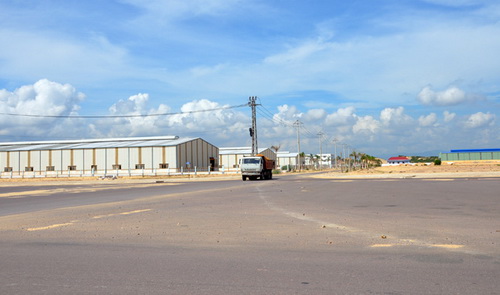The government has given the go-ahead for a project to set up a US$26.9 billion oil refinery in Binh Dinh, a top official of the coastal province’s local government said during a TV dialogue program on Sunday.
“On Friday, the Prime Minister officially signed a document that approves the Nhon Hoi Refinery project implementation,” Ho Quoc Dung, deputy chairman of the provincial People’s Committee, said.
In late April, Binh Dinh authorities said they were speeding up talks with the megaproject’s investor -- Thai state-owned oil and gas company PTT Public Company Limited -- on the Nhon Hoi plant, a move that was strongly opposed by the state-run oil and gas giant PetroVietnam (PVN).
The refinery, to be located in the Nhon Hoi Economic Zone, is expected to be capable of handling some 660,000 barrels a day, or 30 million tons of crude oil a year, five times more than the Quang Ngai-based Dung Quat Refinery – Vietnam’s sole refinery for the time being.
While the province has been seeking permission for the implementation of the project, PVN has said it lacks feasibility.
“As officials who have been directly negotiating and working with the investors, we think the project is highly feasible,” Dung told delegates, adding that he has three arguments to back the assertion.
“First, PTT is financially capable of implementing the project as it currently ranks within the world’s 100 largest corporations with total assets worth more than $50 billion, and annual profits of $3.5 billion,” Dung said.
Secondly, developing a strongly competitive refinery with high production capacity is also one of the development strategies of PTT, he added.
“Lastly, PTT considered the Nhon Hoi economic zone a suitable destination, and the location is, on the other hand, also capable of meeting the investor’s need,” Dung pressed.
“At Nhon Hoi, PTT can start work on the project immediately after obtaining the license as no site clearance is needed and infrastructure is already developed.
“There is also a deep-water port, which will facilitate the import and export of products, while the land leasing fees are acceptable,” he concluded.
Workforce issue
Speaking at the dialogue, Vu Dai Thang, head of the Economic Zone Management Agency under the Ministry of Planning and Investment, commented that Binh Dinh attracting an investor for such a huge project is an audacious plan.
“The planning ministry will support Binh Dinh in evaluating the financial ability of the investor, as well as assessing their requirements for local authorities,” he said.
Once all necessary licenses are obtained, construction on the Nhon Hoi refinery is expected to start in 2016, and finish by mid-2020, according to Man Ngoc Ly, head of the management board of the economic zones in Binh Dinh.
The facility is expected to produce the first batch of products 48 months after becoming operational, he added.
“The project will need some 10,000 – 30,000 direct laborers, and 100,000 indirect ones, which is a tough challenge for the province,” he said.
Dung, the deputy chairman, said the authorities are prepared to deal with this difficulty.
“From now to 2015, Binh Dinh will implement programs that will train 15 – 20 Ph.D holders overseas,” he promised.
“We will also train some 20,000 skilled workers on an annual basis,” he said.



















































